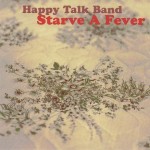 Patti Smith wrote, “Those who have suffered, understand suffering and thereby extend their hand.” If the degree to which Starve a Fever offers a hand to people in hard times is any indication, Happy Talk Band’s Luke Allen has suffered plenty. The people in his songs are struggling in big and small ways; one’s on death row, one can’t sleep, and as “Mugger’s Waltz” reminds us, “Muggers need money too / there are bills to be paid and the babies need shoes.”
Patti Smith wrote, “Those who have suffered, understand suffering and thereby extend their hand.” If the degree to which Starve a Fever offers a hand to people in hard times is any indication, Happy Talk Band’s Luke Allen has suffered plenty. The people in his songs are struggling in big and small ways; one’s on death row, one can’t sleep, and as “Mugger’s Waltz” reminds us, “Muggers need money too / there are bills to be paid and the babies need shoes.”
That doesn’t mean the album’s soft or sweet. Nobody’s life gets better over the course of a song, and Ramona’s doing about as well as anybody in “Ramona’s Wild Ride” as she gets loaded and rides her bike around the Bywater. But throughout, Allen shows that somebody cares, even if sympathy and well wishes are the best that he can manage.
When it’s not in his words, sad compassion is in his voice. He strikes notes of resignation—all this caring won’t mean a thing—and private melancholy is his dominant mode, but he sings with strength and conviction. That suggests that each of these lives is important, if only to him, but that’s something.
That thread of compassion is one of the things that make Starve a Fever the most coherent Happy Talk Band album; another is the band. In the last year, the lineup has solidified with the Morning 40 Federation rhythm section, Casey McAllister on keyboards and Alex McMurray on lead guitar. They define the sound of the album, and when the volume drops for “Mugger’s Waltz” and “Dr. Ike’s Lament,” it’s still their sound—roots rock that comes from city living, modern country music from New Orleans’ bohemia. It’s not retro, but it gives the songs context and hints at how to think about them. The punk raggedness locates the album in the rock ’n’ roll tradition, and the country frames it as working class music with a high threshold for excess.
Mark Bingham’s production highlights the art in Allen’s songs, which often means imposing a little restraint on them. As a result, Starve a Fever doesn’t rampage like the band does live, but it showcases the gentle warmth underneath the big rock bluster, and as powerful as big guitars and rock rage are, Luke Allen’s bruised heart is what makes Happy Talk Band special.




